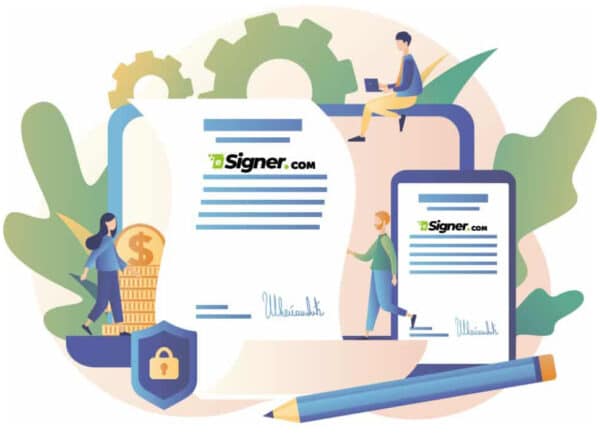Explore SSL.com’s eSigner Cloud Signature Consortium (CSC)-compliant API and eSigner Express web application for Extended Validation (EV) code signing and Adobe-trusted digital signatures for document signing.
SSL.com is a member of the Adobe Approved Trust List (AATL), which allows users to create digital signatures that are automatically trusted whenever signed documents are opened in Adobe Acrobat or Reader software. SSL.com recently became an Adobe Registered Reseller authorized to bundle Adobe Acrobat Sign with our eSigner cloud document signing service.
With eSigner, certificates and signing keys are securely stored in the cloud and can be accessed from anywhere, with no need for USB tokens or HSMs. With the launch of eSigner, SSL.com is the only company offering a unified platform and UI for both remote document and code signing.
Features and Benefits
- Unified platform and UI for both document and code signing.
- Cloud Signature Consortium (CSC) cloud signing standard is compatible.
- API, GUI, and command-line tools:
- eSigner CSC API can used to power front-end document and code signing applications.
- eSigner Express GUI web application for document and code signing (see the video below).
- CodeSignTool and DocSignTool command-line tools for code and document signing on Windows, Linux, and macOS.
- Works with signtool.exe and certutil.exe.
- eSigner Document Signing Gateway: A Docker-based solution that distributes as a container and installs on customer premises for companies seeking to maintain document confidentiality without sending files externally. The gateway computes PDF hashes locally and sends only the hash to eSigner CSC API for signing.
- eSigner Cloud Key Adapter (CKA): A Windows-based application that uses the CNG interface (KSP Key Service Provider) to allow various tools to use the eSigner Cloud Signature Consortium (CSC) API. It acts like a virtual USB token and securely loads signing certificates to a computer’s Windows certificate store for use with Windows SignTool, Microsoft 365 applications, and Adobe Acrobat Reader
- Businesses and other organizations can integrate eSigner with their document and code signing workflows (including CI/CD).
- Software publishers and service providers can use eSigner to offer digital signing capabilities to their customers.
- Universally trusted digital signatures:
- Document signatures trusted by Adobe Acrobat and Acrobat Reader.
- EV code signatures are trusted by Microsoft Authenticode for kernel-mode driver signing on Windows 10 or later (through submission to Microsoft Partner Center using Attestation or Windows Hardware Compatibility Program (WHCP) certification). Note: EV certificates do not automatically bypass SmartScreen. As of August 2024, Microsoft treats EV and OV code-signing certificates equally for SmartScreen, as reputation is built over time based on publisher history and software adoption.
- Document signatures include long-term validation (LTV), meaning your digital signatures will remain verifiable for the time of signing, even after your document signing certificate expires or needs to be revoked.
Universally Trusted and Secure
As a globally trusted certificate authority (CA), SSL.com’s public key infrastructure (PKI) and procedures undergo regular, rigorous audits to ensure the trust of major software vendors, including Microsoft, Apple, Adobe, Google, and Mozilla. You can be confident that your private signing key will be generated and stored in a manner that is fully compliant with government and industry standards and regulations.
Learn more about digital document signatures:
PKI-based digital signatures ensure authenticity, integrity, and legal non-repudiation for electronic documents.
Learn more about extended validation (EV) code signing:
Signed code assures users that your software is from a known and trusted developer and protects them from malware. Extended Validation (EV) code signing certificates offer Windows kernel-mode signing and instant SmartScreen reputation.
Enhanced Security Requirements: As of June 1, 2023, both EV and OV code signing certificates require two-factor authentication and must be stored on encrypted USB hardware tokens or in cloud-based, FIPS-compliant hardware appliances. This requirement enhances security for code signing keys and aligns with the CA/Browser Forum’s key storage requirements.
Getting Started with eSigner
These guides and how-tos will help you get started with eSigner document signing:
-
-
- Enroll with eSigner for Remote Document and EV Code Signing
- Sign Documents in the Cloud with eSigner Express
- Remote Document Signing with eSigner CSC API
- Remote EV Code Signing with eSigner
- Integration Guide to Testing Remote Signing with eSigner CSC API
- Team Sharing for eSigner Document and EV Code Signing Certificates
- eSigner FAQ
-
